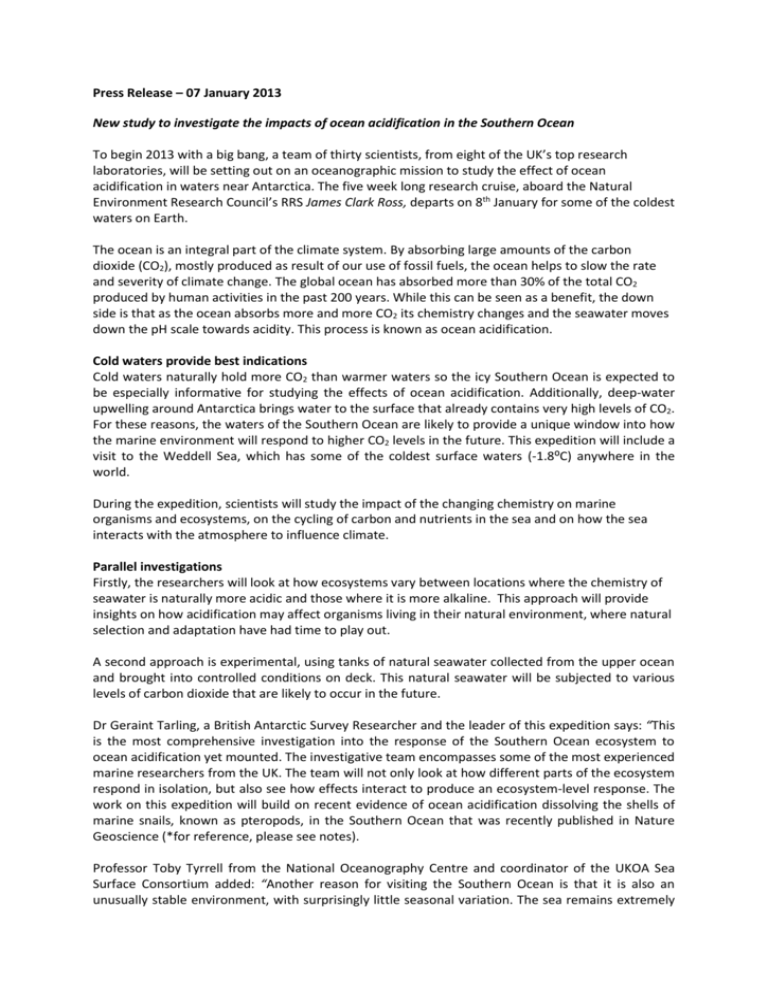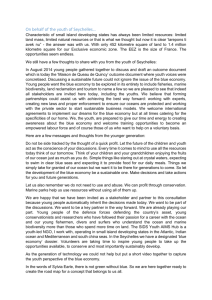New study to investigate the impacts of ocean acidification in the
advertisement

Press Release – 07 January 2013 New study to investigate the impacts of ocean acidification in the Southern Ocean To begin 2013 with a big bang, a team of thirty scientists, from eight of the UK’s top research laboratories, will be setting out on an oceanographic mission to study the effect of ocean acidification in waters near Antarctica. The five week long research cruise, aboard the Natural Environment Research Council’s RRS James Clark Ross, departs on 8th January for some of the coldest waters on Earth. The ocean is an integral part of the climate system. By absorbing large amounts of the carbon dioxide (CO2), mostly produced as result of our use of fossil fuels, the ocean helps to slow the rate and severity of climate change. The global ocean has absorbed more than 30% of the total CO2 produced by human activities in the past 200 years. While this can be seen as a benefit, the down side is that as the ocean absorbs more and more CO2 its chemistry changes and the seawater moves down the pH scale towards acidity. This process is known as ocean acidification. Cold waters provide best indications Cold waters naturally hold more CO2 than warmer waters so the icy Southern Ocean is expected to be especially informative for studying the effects of ocean acidification. Additionally, deep-water upwelling around Antarctica brings water to the surface that already contains very high levels of CO2. For these reasons, the waters of the Southern Ocean are likely to provide a unique window into how the marine environment will respond to higher CO2 levels in the future. This expedition will include a visit to the Weddell Sea, which has some of the coldest surface waters (-1.8⁰C) anywhere in the world. During the expedition, scientists will study the impact of the changing chemistry on marine organisms and ecosystems, on the cycling of carbon and nutrients in the sea and on how the sea interacts with the atmosphere to influence climate. Parallel investigations Firstly, the researchers will look at how ecosystems vary between locations where the chemistry of seawater is naturally more acidic and those where it is more alkaline. This approach will provide insights on how acidification may affect organisms living in their natural environment, where natural selection and adaptation have had time to play out. A second approach is experimental, using tanks of natural seawater collected from the upper ocean and brought into controlled conditions on deck. This natural seawater will be subjected to various levels of carbon dioxide that are likely to occur in the future. Dr Geraint Tarling, a British Antarctic Survey Researcher and the leader of this expedition says: “This is the most comprehensive investigation into the response of the Southern Ocean ecosystem to ocean acidification yet mounted. The investigative team encompasses some of the most experienced marine researchers from the UK. The team will not only look at how different parts of the ecosystem respond in isolation, but also see how effects interact to produce an ecosystem-level response. The work on this expedition will build on recent evidence of ocean acidification dissolving the shells of marine snails, known as pteropods, in the Southern Ocean that was recently published in Nature Geoscience (*for reference, please see notes). Professor Toby Tyrrell from the National Oceanography Centre and coordinator of the UKOA Sea Surface Consortium added: “Another reason for visiting the Southern Ocean is that it is also an unusually stable environment, with surprisingly little seasonal variation. The sea remains extremely cold even in summer. As the local organisms are not exposed to much natural variation, they could be more susceptible to human-induced variations. It is important for us to find out whether this supposition is correct.” Notes for editors: The study is part of the UK Ocean Acidification research programme (UKOA), jointly funded by the Natural Environment Research Council (NERC), the Department of Environment, Food and Rural Affairs (Defra) and the Department of Energy and Climate Change (DECC). Research cruise blog at http://www.antarcticoacruise.org.uk Follow on Twitter @AntarcticOA Research cruise led by Dr. Geraint Tarling (E: gant@bas.ac.uk) Project Coordinator: Prof Toby Tyrrell (E: Toby.Tyrrell@soton.ac.uk) Knowledge Exchange Officer: Athena Drakou (E: a.drakou@soton.ac.uk) Participating marine research centres and universities British Antarctic Survey (BAS) Marine Biological Association (MBA) University of Southampton National Oceanography Centre (NOC) – NERC Plymouth Marine Laboratory (PML) Scottish Marine Institute (SMI) University College London (UCL) University of Essex Information on 2012 research cruise: Comparable studies have already been carried out by UKOA researchers in Arctic waters, also using RRS James Clark Ross. That month-long research cruise (1 June – 2 July) involved 34 scientists from 8 different institutes. More information, including the research cruise journal, can be found at: Arctic OA Research Cruise: http://www.arcticoacruise.org/ Sea Surface consortium website: http://www.surfaceoa.org.uk/ UKOA website: http://www.oceanacidification.org.uk/ * First evidence of ocean acidification affecting live creatures in the Southern Ocean: The shells of marine snails – known as pteropods – living in the seas around Antarctica are being dissolved by ocean acidification according to a new study published in the journal Nature Geoscience on 25 November 2012. These tiny animals are a valuable food source for fish and birds and play an important role in the oceanic carbon cycle. N. Bednaršek. (2012). Extensive dissolution of live pteropods in the Southern Ocean. Nature Geoscience. 5, 881–885. Doi:10.1038/ngeo1635






